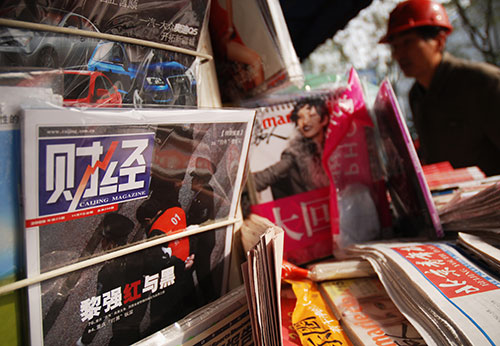Soon after barring children from reality TV and scrubbing the colorful language of a rising vlogger, China’s top media regulator has scolded 15 outlets for publishing false news reports. From Reuters’ Engen Tham:
The business magazine Caijing, Shanghai’s The Paper and the Jinan Times were among the publications that published false news, the State Administration of Press, Publication, Radio, Film and Television (SAPPRFT) said on Friday.
The regulator said a report by Caijing in February on the social decline of a village contained false information and it had retracted the certification of the journalist responsible, Xinhua said.
Online websites that circulated the article without confirming its authenticity would be penalized, it said. [Source]
Elsewhere, the Committee to Protect Journalists has condemned the sentencing of journalist Wang Jing to nearly five years in prison over the distribution of “unconfirmed” and allegedly defamatory information which “caused serious disruptions of online order.” Wang was previously detained in 2014 for reporting an apparent self-immolation in Tiananmen Square.
The authorities’ guardianship of factual accuracy has often focused on rumors, which state media have described as “a cancer that threatens the Internet and society.” In 2013, prison sentences of up to three years were introduced for deliberate falsehoods shared more than 500 times or viewed more than 5000 online; last year, sentences of up to seven years were approved for concocting inflammatory or merely untrue information on topics like diseases, disasters, or police incidents. Even April Fools’ Day jokes are considered inharmonious: state news agency Xinhua warned this year that the occasion “does not conform with our nation’s cultural traditions, nor does it conform with the core values of socialism. Don’t believe rumors, don’t create rumors and don’t spread rumors.” Jason Q. Ng, who has studied the proliferation and censorship of rumors on social media, has written that the Mao-era concept of rumor as “‘any information or opinion at variance with the official construction of reality’—even when that information or opinion was mostly factual” has now been codified in official regulations. This, he suggests, reflects “a strategic attempt to reclaim the commanding heights of mass communication by denigrating unofficial news and commentary outlets.”
Like its definition of rumor, the government’s interpretation of journalistic truth is more complex and idiosyncratic than it might first appear. At China Media Project, David Bandurski translates and comments on a recent People’s Daily op-ed by Renmin University communications scholar Chen Lidan, which offers “an enlightening look at how the Party envisions ‘truth’ in light of its relationship to ‘the people’ or ‘the masses.’”
Chen includes a snippet from Xi Jinping’s February 19 speech [background] that seems to reiterate the crucial role of factual reporting: “Truth is the life of the news. [We] must describe the facts according to the facts, and accurately report individual facts, and from the macro-perspective grasp the full picture of events or things.”
The devil here is not in the details, but in the “macro-perspective” and the “full picture.” After all, it is the Party’s own “macro-perspective,” its own “full picture,” that must arbitrate factuality.
[…] As Chen invokes the words of Lu Dingyi (陆定一), who served as editor-in-chief of the Liberation Army Daily beginning in 1942, the meaning of “factuality” for Chinese journalists becomes clear. Here is what Chen tells his People’s Daily readers:
In 1943, Liberation Army Daily editor-in-chief Lu Dingyi (陆定一) wrote: “When you do reports, you must go and seek advice from those who are personally involved with a matter or in charge of it; listen carefully, taking meticulous notes, and after it is written you must also invite them to look at it (or listen to it) and [abide] their changes. If it is written poorly, you must listen to their opinions and completely rewrite in order to really and truly get at the facts.”
This is factuality with Chinese characteristics. As a practical matter for the news professional, it means checking one’s facts against the enveloping fact of Party rule. [Source]
At South China Morning Post, meanwhile, Nectar Gan reports on an open letter from eight members of the Chinese Academy of Science calling for corrections and changes to an official scientific literacy checklist:
The checklist was compiled by the Ministry of Science and Technology and the government’s Central Propaganda Department.
[…] One “serious mistake”, according to the scientists, was the description of the relationship between force and motion.
[…] They also claimed the were other inaccuracies, such as “all materials consist of atoms” and “the sunlight consists of seven different kinds of monochromatic light”.
[…] Under the section of “knowing how to use systematic methods to analyse and solve problems”, the guidelines demands people know about traditional Chinese philosophical concepts such as yin and yang and the five-elements theory: wood, fire, metal, earth and water . It states these concepts are part of the materialist theory of ancient China and have “realistic significance”.
The scientists reject this claim and say these so-called theories are often associated with superstitious beliefs. [Source]







